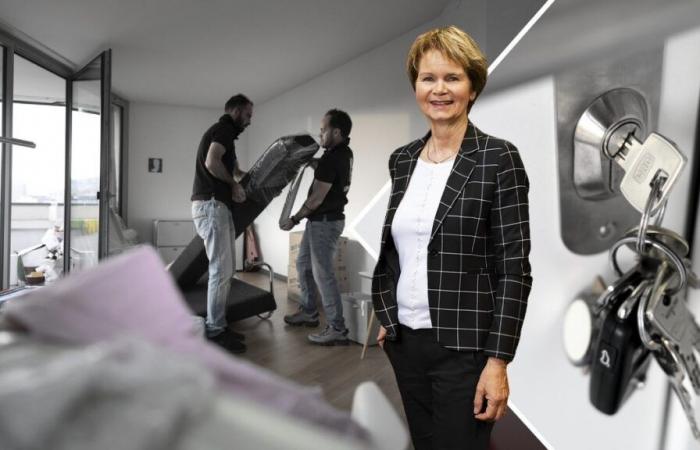Opponents of the reform of tenancy law denounce an attack against tenants.Image: keystone/watson
Changes to lease law are being put to a vote on November 24, 2024. Here is how the owners defend their project.
Christoph Bernet / ch media
The Swiss are voting this November 24 on two important changes to tenancy law. Opponents of the reform in question, for their part, denounce an attack on the rights of tenants by owners. In this interview, Brigitte Häberli-Koller, state advisor and vice-president of the Swiss Landlords’ Association, rejects these accusations and calls on the Federal Council to assume its responsibilities.
Why are the two changes to tenancy law that we will vote on on Sunday necessary?
Brigitte Häberli-Koller: What we need are clear rules, legal certainty and transparency. It is for these reasons that these proposals were tabled in Parliament and adopted by a clear majority.
Brigitte Häberli-Koller is a member of the Center.Image: KEYSTONE
The Federal Council rejected the changes during parliamentary debates. He believed that the existing law was sufficient and that the changes were not balanced. Why didn’t the bourgeois majority listen to him?
A clear majority of both chambers recognized the need for action. It would in fact be more relevant to tackle a global revision of tenancy law. Unfortunately, the round tables on tenancy law organized by Federal Councilor Guy Parmelin failed – primarily because of the tenant representatives. This is why Parliament intervened. Now the Federal Council recommends accepting both projects…
…because the Constitution obliges him to defend the position of Parliament. Next question: These are minor adjustments, say supporters of the project. Why then are you launching the voting campaign with a budget significantly higher than that of the opponents, i.e. around 3.3 million francs?
These two changes must be considered in their overall context. We need legal certainty to encourage the construction of new housing. I think, for example, of a homeowner in my Thurgau municipality who builds two new apartments in his house, saying: “I want to use my house better, create more living space and, of course, earn some income.” We want to encourage such approaches, and for this, clear rules are needed.
In the event of subletting, tenants must now obtain prior agreement from the lessor by handwritten signature. This is contrary to the general trend in rental law – for example, formal requirements have been reduced for the communication of rent increases. Why is this formalism necessary?
Based on current practice, we believe that a written agreement is in the best interests of all three parties – landlord, tenant and subtenant. This is also what the city of Zurich, governed by the left, requires for its own apartments, for which it also limits subletting to one year. In the canton of Vaud, the written consent of the lessor is also required. For apartments belonging to the city of Lausanne, subletting is in principle prohibited.
The city of Zurich’s rules concern publicly owned, partly subsidized housing subject to minimum occupancy rules, it is logical that stricter requirements are necessary.
We offer a limited duration of two years. I have to say that I really don’t understand the opposition here.
However, this deadline applies to all sublease contracts in Switzerland. After two years, lessors can refuse subletting without having to justify themselves. Does this change the balance of power?
No, the right to sublet is maintained. We specify it simply and limit it in principle to two years. But this is what we call operative law. If both parties agree, longer sublets are possible without problem. Given the current housing shortage, I believe it is appropriate that after two years of subletting, tenants decide to return or vacate the accommodation.
It’s not just entire apartments that are sublet. Housing communities or elderly people who wish to remain in their home after the death of their partner rent single rooms to share housing costs. Will this still be possible in the future?
Of course, this goes without saying. Subletting is already possible today only with the agreement of the lessor. In such constellations, we must seek dialogue and reach a clear and transparent agreement. Nothing basically changes. We simply want more legal certainty and less abuse.
Subletting is also common in commercial leases, for example in collective medical practices, hair salons or shared offices. In this case, tenants often make large investments in the rented premises. Doesn’t the two-year limit bring more insecurity?
The vast majority of commercial leases are fixed-term, long-term rental contracts. In the vast majority of cases, these contracts already carefully regulate issues such as investment compensation or subletting. The proposed amendments change virtually nothing in practice in this area. The Swiss Union of Arts and Crafts has also clearly said yes to both projects.
The second modification concerns the specific need, which must be able to be invoked more easily. What problem would we solve here?
This is really only a small definitional change. The term “emergency” means, to me, absolute urgency. We want to expand it a little. There are shocking cases today, especially for companies that want to expand. It should be possible, by respecting all deadlines and all avenues of appeal, to be able to use one’s own premises within a relatively predictable period of time. This is also what property rights require.
The opposing party claims that this is actually about facilitating the eviction of tenants in order to increase rents after a change of tenant. Rightly so?
No, that’s absolutely false. We want more clarity and a good relationship between owners and tenants.
“Any change of tenant entails effort, inconvenience and costs”
There is therefore nothing better for landlords than stable, long-term leases, as is fortunately the case in the vast majority of cases.
Parliament is already discussing the next interventions by lessors aimed at modifying the right of lease. Do you practice the salami tactic, one end at a time?
No, I would have preferred a global review of tenancy law, but the opposing party was not very cooperative. Therefore, Parliament has taken up individual points and is discussing amendments. Where majorities emerge, a referendum can be launched and, in the end, the people can decide for themselves. This is a completely normal political process.
Currently, Parliament is debating simplifying rent increases and making it more difficult to challenge the initial rent. After years of sharply rising rents and good returns, this looks like a policy of landlord interests driven by greed.
This needs to be seen in a broader context. Fundamentally, it’s about creating more housing in our country.
“We must encourage private and institutional owners to build more and more densely”
Clear rules and good framework conditions facilitate the construction of new quality housing. This is something that both parties benefit from.
The simplified increase in rents targeted does not allow new housing to be built, it simply increases yield.
I don’t agree. This involves possibly being able to adapt rents during a change of tenant when conditions have changed. Of course, always by mutual agreement and in compliance with all available remedies. Good framework conditions are particularly important so that institutional real estate owners, for example our pension funds, can manage their affairs well.
Swiss law does not provide for market rent, but rent based on costs with a capped yield. Despite falling costs for property owners, rents have risen sharply in recent years. Are property owners not respecting the rules of the game and asking for excessive rents?
Fortunately, in Switzerland, everyone must comply with the laws and rules in force. This of course also applies to landlords. A measured return is necessary to build provisions and ensure sustainable management. In the event of abuse, tenancy law provides exhaustive tools for both parties to assert their rights. Sunday’s plans will change absolutely nothing. We simply want more clarity and good relations between landlords and tenants.
You want a global review of tenancy rights. Who should take the first step?
It would really be desirable if we looked at lease law as a whole and both parties could discuss the controversial points together and eliminate them. I also expect the Federal Council to finally take its responsibilities. It should develop a measured and sensible overall review and send it for consultation and then to Parliament.
More articles on the Swiss population
Translated and adapted from German by Léa Krejci







